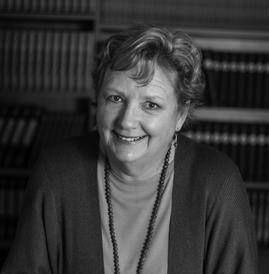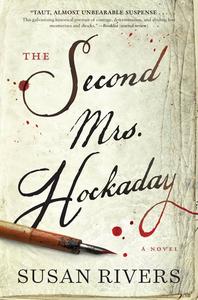
|
|
| photo: Tasha Thomas | |
Susan Rivers was awarded the Julie Harris Playwriting Award for Overnight Lows and the New York Drama League Award for Understatements. She is also the recipient of two playwriting grants from the National Endowment for the Arts and has had short fiction published in the Santa Monica Review. In 2007, she earned an MFA in fiction writing from Queens University of Charlotte in North Carolina, where she was also awarded a Regional Artist Grant from the Arts and Sciences Council. She lives and writes in a small town in upstate South Carolina. The Second Mrs. Hockaday (Algonquin, January 10, 2017) is her first novel.
On your nightstand now:
Roderick Hudson by Henry James (for James's difficulty, subtext)
The History of Wolves (galley) by Emily Fridlund (best debut novel I've read recently)
The Sympathizer by Viet Thanh Nguyen (funny, sick, sad)
Catullus' Bedspread by Daisy Dunn (a funny, sick, sexy thing happened on the way to the forum)
The Classical World by Robin Lane Fox (companion book for Dunn)
The Fabric of Defeat: the Politics of South Carolina Millhands, 1910-1948 by Bryant Simon (research for the book I'm writing now)
Favorite books when you were a child:
The bookmobile in my rural county had limited inventory, so I read some of the same books over and over: Hans Brinker, or The Silver Skates by Mary Mapes Dodge, My Side of the Mountain by Jean Craighead George, all of Grimm's fairy tales and the Wizard of Oz stories. I remember being obsessed with that Oz-rageously flashy dresser, Jack Pumpkinhead, to the point of imagining him as a potential mate. (And I just realized why I was a fan of David Bowie and Prince when I got older.)
Your top five authors:
This is going to sound very Harold Bloom-ish: top of the fiction pantheon are Jane Austen, Herman Melville, Thomas Hardy, Virginia Woolf and William Faulkner. That means I have to leave off writers savored in translation: Tolstoy, Kafka, García Márquez and Proust (only vol. 1--I'm not smart enough for the other six). I'm big on 150-year-old writers, clearly.
Book you've faked reading:
At my age I don't fake anything. It's so liberating. Books you're an evangelist for:
Books you're an evangelist for:
Hyperbole and a Half by Allie Brosh. If Kafka had taken in stray dogs and had worn a hoodie.
Miss Jane by Brad Watson. I love "quiet" books that are anything but. Watson's prose feels effortless, and that's the hardest to get right.
The Rug Merchant by Meg Mullins, about a doomed affair between an Iranian immigrant and a Barnard college student. Her characters--and her rug--haunted me for a long time.
Book you've bought for the cover:
Slade House, of course, by David Mitchell.
Book you hid from your parents:
Since my parents weren't literary there was no need to hide books from them. However, when I was 14, I was invited to spend the summer with a school friend who had moved to Belgium, and her well-read father invited me to make use of his library. Clearly, he hadn't expected me to pick up Terry Southern and Mason Hoffenberg's Candy; all hell broke loose when he saw me settled in an armchair with that book, laughing my head off. That was my first experience of censorship.
Book that changed your life:
I took Anglo-Irish Lit in college and the professor was gaga over W.B. Yeats. When I finished the course, I never again wanted to hear about widening gyres or ragged bone shops of the heart. But after graduation I was starving for my art in San Francisco's fringe theater scene, feeling restless and lonely. I went back to Yeats's Selected Poems and my head exploded. I wrote my first play about Yeats's unrequited love for Maud Gonne, and that production opened a lot of doors. Eventually I transitioned out of the theater into prose writing, but Willy B. remains my first love. His poems grow more powerful and more personal the older I get, like Shakespeare's sonnets.
Favorite line from a book:
From Vol. 1 (Swann's Way) of In Search of Lost Time by Marcel Proust:
"I have every useless thing in the world in my house [in Paris]. The only thing wanting is the necessary thing, a great patch of open sky like this. Always try to keep a patch of sky above your life, little boy."
I keep this passage pinned to the board above my writing desk, reminding me to hang on to that sky.
Five books you'll never part with:
When the end comes, they're going to have to rip a lot more than five books from my cold, dead hands. Here's what will be in my orange SIBA tote bag when the seven trumpets sound:
The Holy Bible, King James Version. If you're going to write about Southern lives, you've got to know your Bible. I came to it late, but I'm learning. The companion book to this needs to be Edith Hamilton's Mythology, because the Greeks did it all first.
Anna Karenina by Leo Tolstoy. I once had a writing instructor who insisted that the protagonist be introduced within the first few pages of a novel. I brought A.K. to class one day and showed him that Anna doesn't make an appearance until Chapter 18. He was not amused.
One Hundred Years of Solitude by Gabriel García Márquez. Fiction was never the same after this novel came out. I was never the same. Nothing was ever the same.
The Great Gatsby by F. Scott Fitzgerald. All the principals in Gatsby are profoundly unhappy and dissatisfied. So what's their plan of action? They pursue precisely those things that make them unhappy and dissatisfied. So American.
Jane Eyre by Charlotte Brontë and Wuthering Heights by Emily Brontë (boxed set). We didn't have much money growing up, which is why our mother used to take my sisters and me Christmas shopping in junkshops. In one of those shops my sister Caitlin bought me the 1944 Random House two-volume edition with the spooky Fritz Eichenberg woodcuts. Whenever I was sick in bed, I took out the box and read one of the novels from beginning to end. Cait's gone now and I no longer have time to lie in bed, so this set is extra-special.
Book you most want to read again for the first time:
Siddhartha by Hermann Hesse. I'd like to know if I'm remembering the ending correctly or if I'm confusing it with the final scene in Candy.
Best piece of advice you ever got about writing:
I took care of my dear mother in the final years of her life. In one of our last cogent conversations I told her that I'd finally finished my first novel. She asked, "How long is it?" I told her it was 650 pages. "Oh my!" she said. "I guess some people don't know when to shut up."
I kept that in mind when I wrote The Second Mrs. Hockaday; it's fewer than 300 pages. And I probably should have kept that in mind when I answered these questions.

